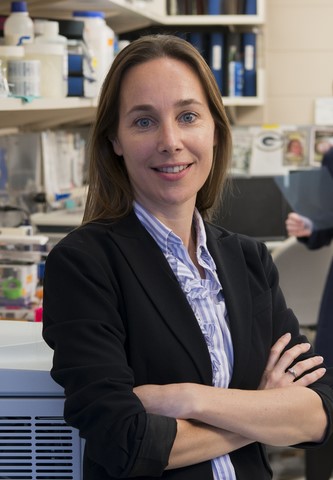Laureate 2021
Antwerp geneticist Rosa Rademakers has been awarded the Generet Award for Rare Diseases for her research into less commonly occurring forms of dementia. The Prize, awarded by the Generet Fund, managed by the King Baudouin Foundation, is linked to one million euros (~ 1.15 million USD) in funding, making it the most prestigious Award for rare diseases in both Belgium and Europe. Prof. Rosa Rademakers is the first female winner of the Generet Award and also the youngest ever. The jury praised her prestigious international career and her far-reaching ambitions to give patients with dementia a better life through her research.
Frontotemporal dementia is an umbrella term for a group of brain disorders that primarily affect the frontal and temporal lobes of the brain. This form of dementia can affect people relatively early in life, often when they are only forty or fifty years old. The disease is incurable and patients usually die within 10 years of diagnosis. The condition therefore has a tremendous impact on patients and their loved ones. About 1 in 5,000 people are living with this form of dementia.
“Unlike people with Alzheimer’s disease, patients with frontotemporal dementia do not experience as many memory problems”, explains Rosa Rademakers. “They do, however, present with major changes in behaviour and personality: they come across as uninhibited, their social behaviour may be inappropriate and sometimes they even become aggressive. In many cases people with frontotemporal dementia also have language or speech problems. This is in fact a diverse group of degenerative brain diseases: some forms are inherited but others are not. What is more, not all patients have the same type of defects in their brains.”
Youngest Full Professor ever at the Mayo Clinic
Identifying the causes of this group of degenerative brain diseases has become the life’s work of Rosa Rademakers. She received worldwide fame for her research during her 14 years at the prestigious Mayo Clinic in Jacksonville (Florida, US). In 2019 she returned to Belgium to lead the VIB Center for Molecular Neurology at Antwerp University.
Professor Guojun Bu, Mary Lowell Professor of Medicine and Chair of the Department of Neuroscience at the Mayo Clinic: “Rosa arrived in 2005 at the Mayo Clinic as a Visiting Postdoctoral Scientist. Already in 2014, at the age of 36, she became Full Professor, the youngest in history of the Mayo Clinic. She achieved this by discovering the most important disease genes and the molecular pathways leading to frontotemporal dementia. Rosa and I interacted on a daily basis. I am sure Rosa and her team will continue on their successful research path, now that she returned to Belgium.”
Genes and disease mechanisms
Up to now research on frontotemporal dementia has been focusing on two forms: the first involving a protein called Tau that accumulates in patients’ brains, while the second form causes accumulation of a protein called TDP-43. Rosa Rademakers aims to use the one million euros in funding from the Generet Prize to work on a third and even less common form of frontotemporal dementia that involves accumulation of the FUS protein.
“We first described this third sub-group in 2009”, Rosa Rademakers continues. “They account for fewer than 10% of all patients with frontotemporal dementia. We actually still know very little about this disease. We can only make a final diagnosis on the basis of an autopsy, so when the patients have passed away. That means there are not many patients available for research.”
International collaboration
Rosa Rademakers is known as a person who builds networks and research consortia. “Our research stands or falls with the availability of data, blood and brain tissue from patients”, the Antwerp geneticist continues. “Their participation is essential for our work. However, gathering this material does take time and it requires international collaboration.”
As early as 2010 Rosa Rademakers started an international consortium to bring together neurologists and pathologists from Europe, North America, Australia and beyond for the research into the FUS form of frontotemporal dementia. This requires determination: “It has taken us more than ten years to gather material from a large enough group of patients, but now we can start our research. We are also joining forces with international partners with different technological expertise. This includes Prof. Dorothee Dormann from the Institute for Molecular Biology in Mainz (Germany), who is an expert on the FUS protein and related proteins.”
Dorothee Dormann: “We aim to use the funding from the Generet Prize to find out why FUS accumulates in patients’ brains and to understand the precise role of the protein and its interaction partners.” “Our research will penetrate right down to the level of molecules within individual brain cells”, adds Rosa Rademakers. “The latest technologies now allow us to do that.”
Tools to improve diagnosis and treatment
Rosa Rademakers concludes: “Unravelling the molecular background to the various forms of frontotemporal dementia not only provides insights into the underlying disease mechanisms. It is also giving us tools that we can use to improve diagnosis and follow-up of patients, with ultimately even the possibility of a treatment.” Prevail Therapeutics, a company subsidiary of Lilly, recently started a clinical trial on a treatment for the TDP-43 form of frontotemporal dementia. The trial is based on fundamental research conducted in Antwerp and Jacksonville in which Rosa Rademakers took part.
Laboratory of Prof. Rademakers
Press release of the King Baudouin Foundation
